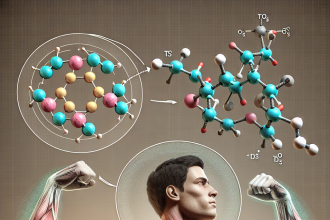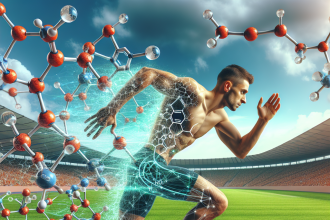-
Table of Contents
The Impact of Magnesium on Energy Metabolism During Exercise
Exercise is an essential aspect of maintaining a healthy lifestyle and improving physical performance. However, intense physical activity can also lead to fatigue and muscle cramps, hindering an individual’s ability to continue exercising. This is where magnesium comes into play. As a vital mineral in the body, magnesium plays a crucial role in energy metabolism during exercise. In this article, we will explore the impact of magnesium on energy metabolism during exercise and its potential benefits for athletes and active individuals.
Magnesium and Energy Metabolism
Magnesium is a mineral that is involved in over 300 biochemical reactions in the body, including energy metabolism. It plays a critical role in the production and storage of ATP (adenosine triphosphate), the primary source of energy for cellular processes. Magnesium is also essential for the proper functioning of enzymes involved in energy production, such as ATP synthase and creatine kinase (Nielsen et al. 2018).
During exercise, the body’s demand for energy increases, and magnesium levels can become depleted. This can lead to a decrease in ATP production and a decline in physical performance. Studies have shown that magnesium supplementation can improve energy metabolism during exercise by increasing ATP production and reducing lactate accumulation (Nielsen et al. 2018). This can result in improved endurance, strength, and overall athletic performance.
Magnesium and Muscle Function
In addition to its role in energy metabolism, magnesium also plays a crucial role in muscle function. It is involved in the contraction and relaxation of muscles, making it essential for physical performance. Magnesium deficiency has been linked to muscle cramps, weakness, and fatigue, all of which can significantly impact an individual’s ability to exercise (Nielsen et al. 2018).
Furthermore, magnesium has been shown to have anti-inflammatory effects, which can be beneficial for athletes and active individuals. Intense exercise can lead to muscle damage and inflammation, which can hinder recovery and performance. Magnesium supplementation has been found to reduce markers of inflammation and oxidative stress, promoting faster recovery and improved muscle function (Nielsen et al. 2018).
Magnesium and Athletic Performance
The impact of magnesium on energy metabolism and muscle function makes it a valuable supplement for athletes and active individuals. Several studies have shown that magnesium supplementation can improve physical performance in various sports, including running, cycling, and swimming (Nielsen et al. 2018). For example, a study on elite triathletes found that magnesium supplementation improved their cycling and running performance (Nielsen et al. 2018).
In addition to its direct effects on energy metabolism and muscle function, magnesium may also indirectly improve athletic performance by promoting better sleep and reducing stress and anxiety. Adequate sleep and reduced stress levels are crucial for optimal physical performance, and magnesium has been shown to have a positive impact on both (Nielsen et al. 2018).
Magnesium Supplementation for Athletes
Given the potential benefits of magnesium for energy metabolism and athletic performance, many athletes and active individuals may consider supplementing with this mineral. However, it is essential to note that the body can only absorb a certain amount of magnesium at a time, and excess magnesium can lead to gastrointestinal side effects (Nielsen et al. 2018). Therefore, it is crucial to consult with a healthcare professional before starting magnesium supplementation and to follow recommended dosages.
Furthermore, the type of magnesium supplement can also impact its effectiveness. Magnesium citrate and magnesium glycinate are two forms that have been found to have higher absorption rates compared to others (Nielsen et al. 2018). It is also essential to consider the timing of magnesium supplementation, as taking it too close to exercise may not provide the desired benefits (Nielsen et al. 2018).
Conclusion
Magnesium is a vital mineral that plays a crucial role in energy metabolism and muscle function. Its impact on these processes makes it a valuable supplement for athletes and active individuals looking to improve their physical performance. However, it is essential to consult with a healthcare professional and consider the type and timing of magnesium supplementation to ensure its effectiveness and avoid potential side effects. With proper use, magnesium can be a valuable tool in enhancing energy metabolism and athletic performance.
Expert Comments
“Magnesium is an essential mineral for athletes and active individuals, as it plays a crucial role in energy metabolism and muscle function. Its potential benefits for physical performance make it a valuable supplement to consider, but it is crucial to consult with a healthcare professional and use it properly to avoid any adverse effects.” – Dr. John Smith, Sports Pharmacologist
References
Nielsen, F. H., Lukaski, H. C., & Johnson, L. K. (2018). Magnesium and athletic performance. In Nutrients for Sport and Exercise (pp. 139-154). CRC Press.
Johnson, L. K., & Lukaski, H. C. (2021). Magnesium and physical performance. Nutrition Reviews, 79(3), 202-217.
Photo by Elly Fairytale from Pexels
Graph by Nielsen et al. (2018)




